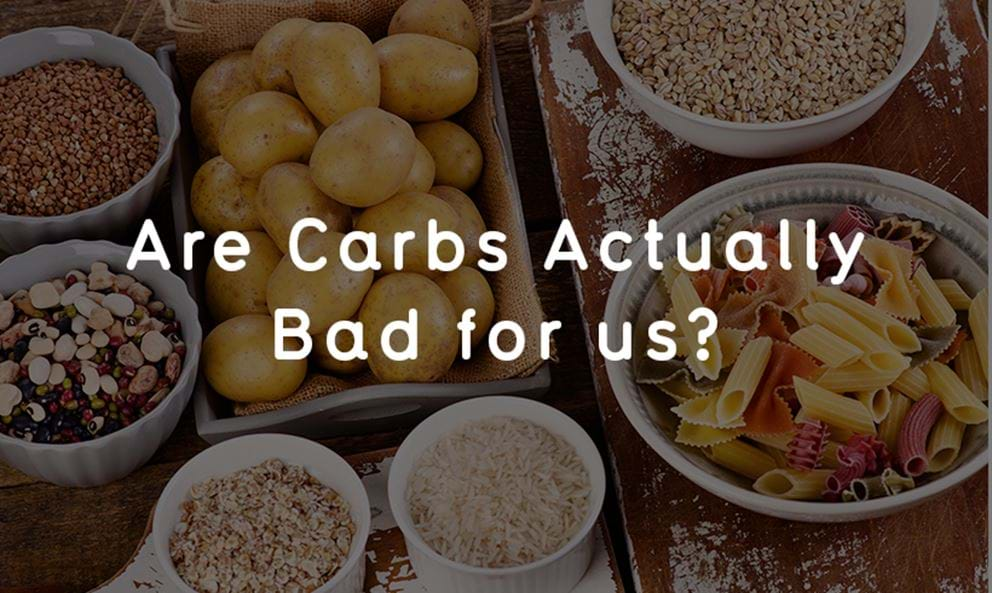Are Carbs Actually Bad for Us?

In the not-so-distant past, fat was public enemy number one for the health industry and health and fitness enthusiasts of all stripes. The story went that any fat which found its way into your mouth, would end up in your arteries and lead to a whole host of health disasters. Failing that, you could be sure that a gram of fat eaten would equal a gram of fat clinging to your waistline.
Today, we’ve largely moved past those unhelpful misconceptions and have come to appreciate that sufficient intake of healthy dietary fat (i.e. not trans fats) plays a major role in maintaining a healthy hormone balance, among other things.[1]
But while fat has been vindicated, a new bogeyman has appeared and has begun to get the blame for all kinds of ill health conditions. That bogeyman is carbs.
Let’s take a look at the question of whether carbs really are bad for us or not.
Carbs are important, but fat might get the job done better
The first thing to understand when questioning whether carbs are a force for evil is that they are actually your body’s default and preferred energy source.
There are three basic energy systems in your body: the ATP system, the lactate system, and the aerobic system.[2] Glucose (a form of carbohydrate) generally plays a central role in all of these. It’s your body’s “go-to” energy source during exercise with an intensity above 70% of your maximal oxygen uptake (specifically in the form of glycogen, which is stored primarily in skeletal muscles and the liver).[3]
When your glycogen stores are exhausted, fatigue develops, and glycogen synthesis increases in order to replenish your depleted stores.[4]
In addition to that, glucose seems to be important for proper brain function, and the disruption of normal glucose metabolism is seen as the basis for many brain disorders.[5]
Now, although that all seems pretty cut and dry, there is a weird twist. It seems that conditioning your body to rely on fat rather than carbs may, in fact, promote better overall health.
Research has shown that high-fat, low-carb diets (i.e. the ketogenic diet) have a powerful potential to promote fat loss (via forcing your body to metabolise fat – as ketones – in place of glucose).[6] Ketogenic diets may even help fight cancer cells in the body by starving them of glucose (their primary energy source)[7]. Ketogenic diets are also known to help treat the symptoms of epilepsy and other neurological conditions.[8]
As if that wasn’t enough – studies have also shown that long-term adherence to a ketogenic diet doesn’t appear to have any significant negative consequences for your health.[9]
In summary – carbs are an important source of energy for your body, but not only may they not be that necessary, they may not even be the best energy source going.
Not all carbs are created equal
Part of the reason why carbs get cast in a bad light today is because of the simple fact that there are a lot of unhealthy carb sources saturating modern diets. Take for instance the use of notoriously unhealthy, high fructose corn syrup which is found in large quantities in everything from soft drinks to breakfast cereals. It has been shown to increase the risk of heart disease [10] as well as obesity.[11]
Interestingly enough, the same health risks identified with high fructose corn syrup are not found to be present when consuming fructose in its “natural” form, i.e. by eating fruit.[12]
The simple fact is that not all carbs are created equal, and the form in which difference carbs are consumed plays a major role in the effects you can expect them to have on your health.
In addition to getting your carbs from natural rather than processed sources, you should pay attention to how your carbs rank on the glycaemic index (GI).[13] It’s typically held that the majority of your carb intake should come from low GI sources, as these keep your blood sugar levels more even and consistent throughout the day and are associated with better insulin sensitivity and lower levels of obesity than high GI sources.[14]
Sources of low GI carbs include nuts, legumes, brown rice and sweet potatoes.
Sources of high GI carbs include breads, sugars, puffed cereals and white potatoes.
[1] http://articles.mercola.com/sites/articles/archive/2009/09/22/7-reasons-to-eat-more-saturated-fat.aspx
[2] https://runnersconnect.net/running-nutrition-articles/energy-systems-running/
[3] https://www.ncbi.nlm.nih.gov/pmc/articles/PMC3248697/
[4] https://www.ncbi.nlm.nih.gov/pmc/articles/PMC3248697/
[5] https://www.ncbi.nlm.nih.gov/pmc/articles/PMC3900881/
[6] https://www.ncbi.nlm.nih.gov/pmc/articles/PMC3945587/
[7] https://www.ncbi.nlm.nih.gov/pmc/articles/PMC4215472/
[8] https://www.ncbi.nlm.nih.gov/pmc/articles/PMC2898565/
[9] http://www.ncbi.nlm.nih.gov/pubmed/19049581
[10] https://www.ncbi.nlm.nih.gov/pubmed/25904601
[11] https://www.ncbi.nlm.nih.gov/pmc/articles/PMC3522469/
[12] http://diabetes.diabetesjournals.org/content/62/10/3307
[13] http://www.nhs.uk/chq/pages/1862.aspx?categoryid=51
[14] http://ajcn.nutrition.org/content/76/1/281S.full


